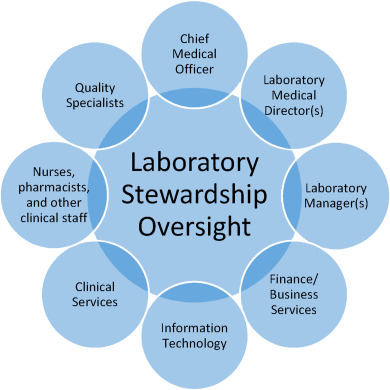Difference between revisions of "Template:Article of the week"
Shawndouglas (talk | contribs) (Updated article of the week text.) |
Shawndouglas (talk | contribs) (Updated article of the week text.) |
||
| Line 1: | Line 1: | ||
<div style="float: left; margin: 0.5em 0.9em 0.4em 0em;">[[File: | <div style="float: left; margin: 0.5em 0.9em 0.4em 0em;">[[File:Fig1 White PractLabMed2021 26.jpg|240px]]</div> | ||
'''"[[Journal: | '''"[[Journal:Strategies for laboratory professionals to drive laboratory stewardship|Strategies for laboratory professionals to drive laboratory stewardship]]"''' | ||
In | Appropriate [[laboratory]] [[Medical test|testing]] is critical in today's healthcare environment that aims to improve patient care while reducing cost. In recent years, laboratory stewardship has emerged as a strategy for assuring [[Quality (business)|quality]] in laboratory medicine with the goal of providing the right test for the right patient at the right time. Implementing a laboratory stewardship program now presents a valuable opportunity for laboratory professionals to exercise leadership within health systems and to drive change toward realizing aims in healthcare. The proposed framework for program implementation includes five key elements: 1) a clear vision and organizational alignment; 2) appropriate skills for program execution and management; 3) resources to support the program; 4) incentives to motivate participation; and, 5) a plan of action that articulates program objectives and metrics. This framework builds upon principles of [[change management]], with emphasis on engagement with clinical and administrative stakeholders and the use of clinical data as the basis for change. These strategies enable laboratory professionals to cultivate organizational support for improving laboratory use and take a leading role in providing high-quality patient care. ('''[[Journal:Strategies for laboratory professionals to drive laboratory stewardship|Full article...]]''')<br /> | ||
<br /> | <br /> | ||
''Recently featured'': | ''Recently featured'': | ||
{{flowlist | | {{flowlist | | ||
* [[Journal:Cybersecurity impacts for artificial intelligence use within Industry 4.0|Cybersecurity impacts for artificial intelligence use within Industry 4.0]] | |||
* [[Journal:Cross-border data transfer regulation in China|Cross-border data transfer regulation in China]] | * [[Journal:Cross-border data transfer regulation in China|Cross-border data transfer regulation in China]] | ||
* [[Journal:Data and information systems management for urban water infrastructure condition assessment|Data and information systems management for urban water infrastructure condition assessment]] | * [[Journal:Data and information systems management for urban water infrastructure condition assessment|Data and information systems management for urban water infrastructure condition assessment]] | ||
}} | }} | ||
Revision as of 17:53, 2 May 2022
"Strategies for laboratory professionals to drive laboratory stewardship"
Appropriate laboratory testing is critical in today's healthcare environment that aims to improve patient care while reducing cost. In recent years, laboratory stewardship has emerged as a strategy for assuring quality in laboratory medicine with the goal of providing the right test for the right patient at the right time. Implementing a laboratory stewardship program now presents a valuable opportunity for laboratory professionals to exercise leadership within health systems and to drive change toward realizing aims in healthcare. The proposed framework for program implementation includes five key elements: 1) a clear vision and organizational alignment; 2) appropriate skills for program execution and management; 3) resources to support the program; 4) incentives to motivate participation; and, 5) a plan of action that articulates program objectives and metrics. This framework builds upon principles of change management, with emphasis on engagement with clinical and administrative stakeholders and the use of clinical data as the basis for change. These strategies enable laboratory professionals to cultivate organizational support for improving laboratory use and take a leading role in providing high-quality patient care. (Full article...)
Recently featured:










